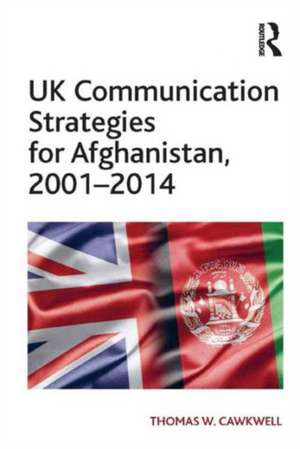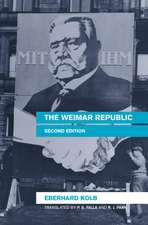UK Communication Strategies for Afghanistan, 2001–2014
Autor Thomas W. Cawkwellen Limba Engleză Hardback – 28 oct 2015
| Toate formatele și edițiile | Preț | Express |
|---|---|---|
| Paperback (1) | 258.50 lei 6-8 săpt. | |
| Taylor & Francis – 14 oct 2024 | 258.50 lei 6-8 săpt. | |
| Hardback (1) | 765.45 lei 6-8 săpt. | |
| Taylor & Francis – 28 oct 2015 | 765.45 lei 6-8 săpt. |
Preț: 765.45 lei
Preț vechi: 1103.53 lei
-31% Nou
Puncte Express: 1148
Preț estimativ în valută:
146.46€ • 152.94$ • 120.95£
146.46€ • 152.94$ • 120.95£
Carte tipărită la comandă
Livrare economică 15-29 aprilie
Preluare comenzi: 021 569.72.76
Specificații
ISBN-13: 9781472473523
ISBN-10: 1472473523
Pagini: 206
Dimensiuni: 156 x 234 mm
Greutate: 0.52 kg
Ediția:1
Editura: Taylor & Francis
Colecția Routledge
Locul publicării:Oxford, United Kingdom
ISBN-10: 1472473523
Pagini: 206
Dimensiuni: 156 x 234 mm
Greutate: 0.52 kg
Ediția:1
Editura: Taylor & Francis
Colecția Routledge
Locul publicării:Oxford, United Kingdom
Public țintă
AcademicNotă biografică
Thomas Cawkwell is an independent scholar based in the north of England. He recently completed his doctorate in sociology at the University of Exeter, following previous degrees from the University of Hull. He was born in Yorkshire and raised in Texas, creating an enduring interest in the 'special relationship' and its role in the 'War on Terror'.
Cuprins
Chapter 1 Strategy, Communication, and ‘Strategic Communication’; Chapter 2 Transnationalisation, Transnational Dilemmas, and Strategic Communication; Chapter 3 The Rise of the Stabilisation Narrative; Chapter 4 The Fall of the Stabilisation Narrative; Chapter 5 The Counter-narcotics Narrative; Chapter 6 The Counter-terrorism Narrative; Chapter 7 Conclusion: The State of British Strategy and the Utility of Strategic Communication;
Recenzii
'Thomas Cawkwell provides a fine-grained examination of the evolution of UK strategy and civil-military relations during the war in Afghanistan, as well as a detailed insight into the wider evolution of defence and security policy making during this period, and the workings of the Blair, Brown and Cameron governments in Whitehall. His book develops a powerful critique of British strategy making in the Afghan context between 2001-14.'
Timothy Edmunds, Bristol University, UK
'A well-informed and thoughtful response to British strategic dilemmas over Afghanistan, focussing on the issues raised by having to devise a coherent defence of strategy in the context of difficult international and domestic contexts. A significant contribution to the debate over current British strategy.'
Jeremy Black, University of Exeter, UK
'This important and closely argued work clearly shows how the constraints of transnational alliances and internal dissonance are at the heart of current problems within British strategy. In detailing how the UK’s strategic narrative in Afghanistan shifted and morphed in response to both these constraints and operational realities, Cawkwell fascinatingly highlights the inconsistencies, not only in the message, but also in the strategy such messages were meant to support. It is a must read for those interested in British policy, strategy, or communications.'
Patrick Bury, University of Exeter, UK
"Cawkwell offers here a forensic analysis of changing narratives of British propaganda strategies in Afghanistan from the invasion until the war ended. It further adds to a body of evidence and scholarship critiquing the role the centrality of the United States plays in British foreign policy. Argument focuses on how the 'transnational dilemma' (King, 2010) between appealing to the public about the benefits of collective security makes acknowledging realistic costs of delivery difficult in strategic narratives."
Emma L. Briant, University of Essex, UK
Timothy Edmunds, Bristol University, UK
'A well-informed and thoughtful response to British strategic dilemmas over Afghanistan, focussing on the issues raised by having to devise a coherent defence of strategy in the context of difficult international and domestic contexts. A significant contribution to the debate over current British strategy.'
Jeremy Black, University of Exeter, UK
'This important and closely argued work clearly shows how the constraints of transnational alliances and internal dissonance are at the heart of current problems within British strategy. In detailing how the UK’s strategic narrative in Afghanistan shifted and morphed in response to both these constraints and operational realities, Cawkwell fascinatingly highlights the inconsistencies, not only in the message, but also in the strategy such messages were meant to support. It is a must read for those interested in British policy, strategy, or communications.'
Patrick Bury, University of Exeter, UK
"Cawkwell offers here a forensic analysis of changing narratives of British propaganda strategies in Afghanistan from the invasion until the war ended. It further adds to a body of evidence and scholarship critiquing the role the centrality of the United States plays in British foreign policy. Argument focuses on how the 'transnational dilemma' (King, 2010) between appealing to the public about the benefits of collective security makes acknowledging realistic costs of delivery difficult in strategic narratives."
Emma L. Briant, University of Essex, UK
Descriere
This book investigates how the war in Afghanistan was ’sold’ to the British public and how Britain’s ’transnational’ foreign and defence policy impacted on the unfolding of UK strategy in Afghanistan and the way it was communicated. This kind of ’strategic’ communication is increasingly becoming a focus of the UK state as it faces a transnational dilemma of maintaining its collective security bonds whilst facing a public increasingly sceptical of liberal interventionism.














